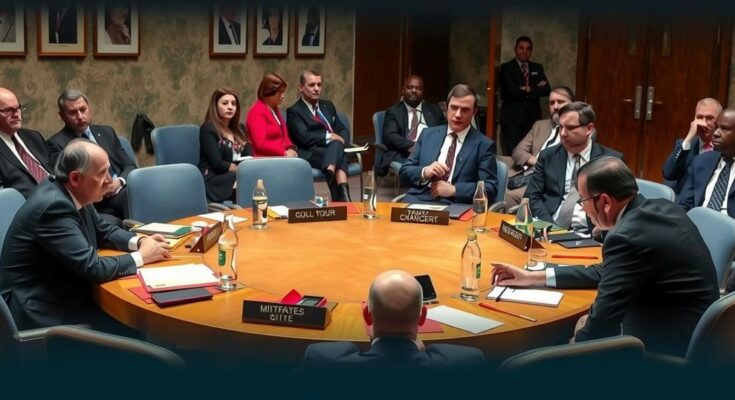The UN Security Council has highlighted the urgent need to address ongoing violence in eastern DRC, reporting on political tensions and the actions of armed groups. Efforts like the Luanda process and governance reforms aim to promote stability, but challenges remain, including humanitarian crises and gender-based violence. The involvement of regional leaders is crucial in tackling these issues for lasting peace.
On Monday, the United Nations Security Council convened to discuss the urgent need to quell the ongoing violence in the eastern Democratic Republic of the Congo (DRC). The UN Special Representative for the DRC, Bintou Keita, briefed the Council, detailing recent political rifts over constitutional reforms and the escalating insecurity plaguing the eastern provinces of North Kivu and Ituri. This instability has been exacerbated by activities from armed groups, notably the Allied Democratic Forces (ADF), M23, CODECO, and Zaïre.
Ms. Keita highlighted the proactive measures being taken to address this violence, commending the Luanda process led by Angola, which promotes diplomatic mediation in the region. A summit scheduled for December 15 will convene leaders from Angola, the DRC, and Rwanda to discuss strategies for fostering peace and stability, reflecting the progress achieved thus far. However, she emphasized that local and regional processes must be aligned with international efforts to ensure enduring peace.
Furthermore, Ms. Keita reported on notable governance reforms initiated by DRC authorities, aimed at enhancing the purchasing power of citizens, providing better access to essential social services, and strengthening the country’s security apparatus. She encouraged all stakeholders to collaborate and mitigate tensions surrounding potential constitutional revisions to maintain stability. The ongoing Luanda process has seen progress following a ceasefire agreement reached in July between the DRC and Rwanda, with new mechanisms established for monitoring compliance.
The security situation in North Kivu remains critical, with the M23 continuing to expand its territorial control, while the ADF has been identified as the most lethal group, having caused numerous civilian casualties. Despite a decrease in attacks from CODECO and Zaïre, the protection of civilians remains an urgent concern, particularly in areas heavily endowed with natural resources. Ms. Keita urged countries in the Great Lakes region to enhance their coordination to combat the illegal exploitation of these resources, which often fuels conflict.
The ongoing humanitarian crisis, exacerbated by climate-related challenges, has resulted in approximately 6.4 million people being displaced. However, there is some optimism as the 2024 Humanitarian Response Plan for the DRC is reportedly over 50% funded, reflecting an improvement in aid availability compared to previous years.
As the annual campaign to combat violence against women concludes, Ms. Keita reported over 90,000 cases of gender-based violence documented this year, with nearly half occurring in North Kivu. She praised the government’s initiatives to address such violence, while also reiterating a zero-tolerance policy towards sexual exploitation by UN personnel. In closing, she amplified the voices of women and vulnerable populations in the DRC calling for sustainable peace, emphasizing their desire to return to their homes and communities with dignity.
The Democratic Republic of the Congo has been experiencing prolonged conflicts characterized by violence and instability, particularly in the eastern regions. Multiple armed groups operate within these areas, exacerbating humanitarian crises and undermining governance. Recent political disagreements surrounding constitutional reforms have added complexity to the situation, necessitating both local and international efforts to foster peace. The Security Council’s discussions and the involvement of regional powers highlight the multifaceted approach required to address these challenges.
The discussions held by the Security Council underscore the urgent necessity to alleviate violence in the eastern DRC, with emphasis on collaborative international and regional efforts. The recommendations stemming from various stakeholders, alongside governance reforms and humanitarian aids, are pivotal in striving towards lasting peace. Engaging local communities, particularly marginalized groups, will further strengthen these resolutions and enable a holistic approach to stability in the region.
Original Source: news.un.org




